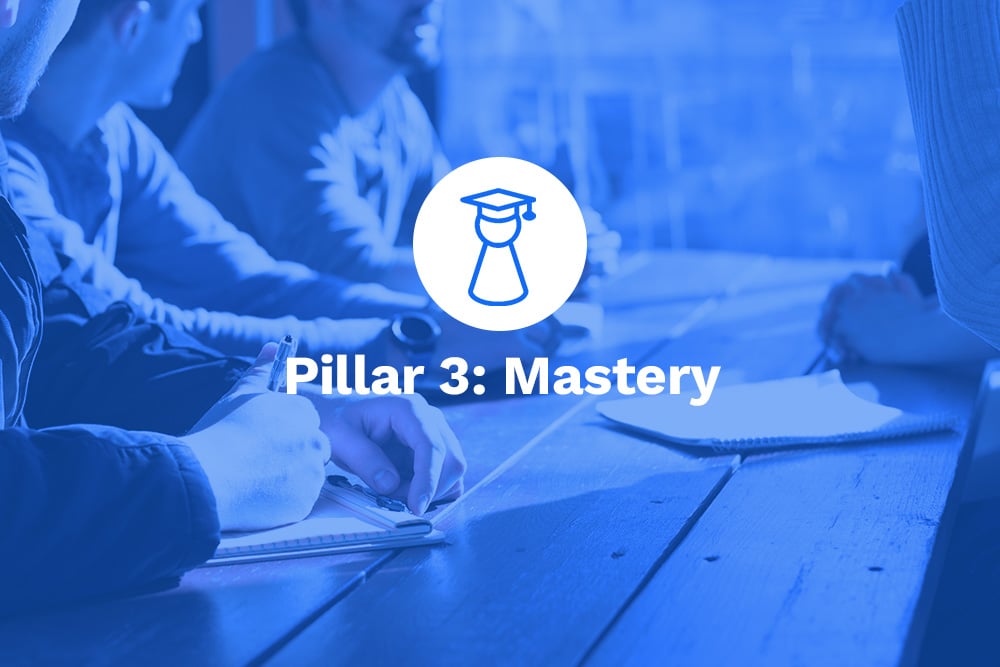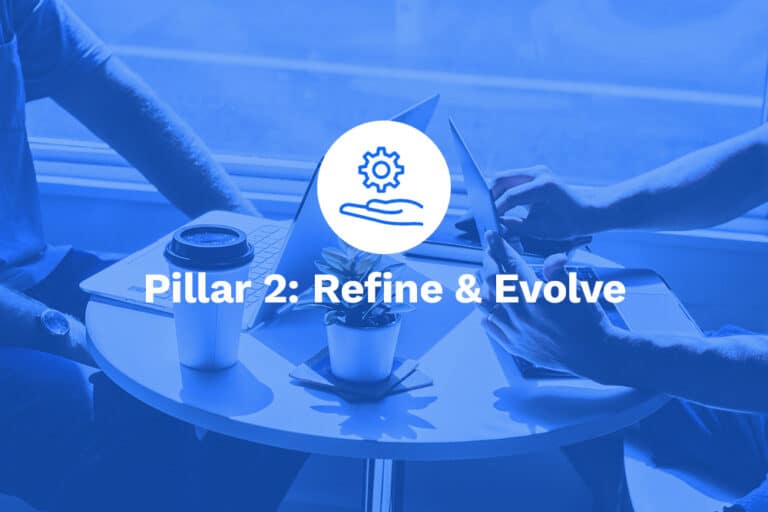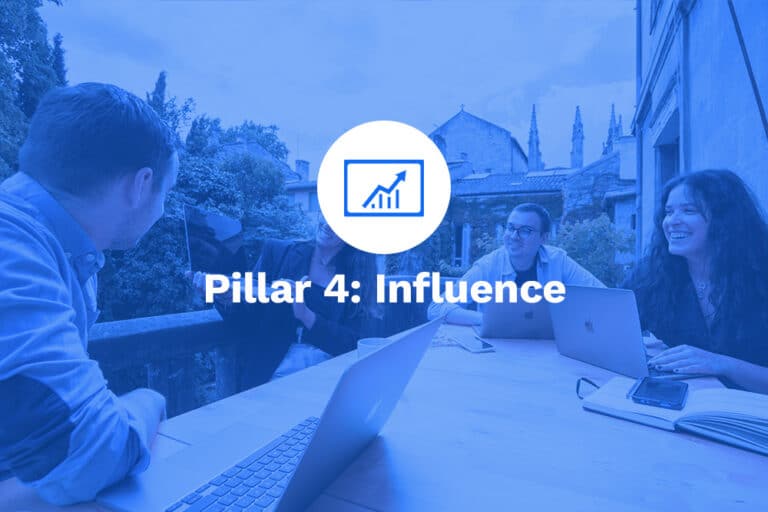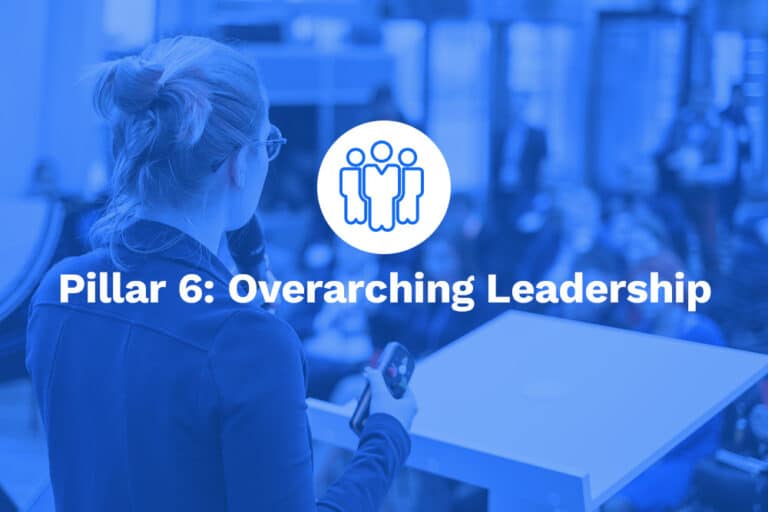Pillar 3 – Mastery: Effective Collaboration
Competency Overview
Effective Collaboration is a vital competency in the Mastery pillar. In today’s interconnected work environment, the ability to work well with others, seek and use their input, and bring together cross-functional teams is essential for success. Effective collaboration involves understanding when to involve team members in decision-making, being viewed as someone who adds value to cross-functional projects, and using others’ input for critical actions, timelines, methodologies, and priorities. At Leader Loop, we know that mastering collaboration skills is key to driving projects forward and achieving organizational goals.
Interestingly, collaborative teams are 5 times more likely to be high-performing in creativity and innovation compared to their non-collaborative counterparts (Deloitte). Moreover, effective teamwork and collaboration can boost business sales by 27% and improve product quality by 34% (Frost & Sullivan). These statistics underscore the significant impact that strong collaboration skills can have on both individual and organizational success.
Leveling Up
Mastering Effective Collaboration sets you apart as a team player who can seamlessly integrate into various projects and teams. This competency helps you leverage the strengths and insights of others, leading to better decision-making and more innovative solutions. Being known for your collaborative skills enhances your reputation and makes you a go-to person for cross-functional projects. Developing these skills can lead to greater opportunities for leadership and career growth, as organizations highly value individuals who can work well with others to achieve common goals.
Why It Matters
- Leveraging Diverse Perspectives: Seeking and using others’ input ensures that decisions are well-rounded and benefit from multiple viewpoints.
- Cross-Functional Teamwork: Understanding when to bring in cross-functional members fosters a more integrated and cohesive approach to projects.
- Value Addition: Being viewed as someone who adds value to cross-functional projects enhances your professional reputation and influence.
Competency in Action
- Seeks & Uses Others’ Input (Critical Actions, Timelines, Methodology, Priorities)
- Common Pitfalls to Avoid: Ignoring team input, making decisions in isolation, and failing to consider different perspectives can lead to suboptimal outcomes.
- Benefits: Actively seeking and using others’ input ensures that decisions are comprehensive, well-informed, and more likely to succeed.
- Understands When to Bring Cross-Functional Members in Decision Making
- Common Pitfalls to Avoid: Involving the wrong people, delaying decisions by involving too many stakeholders, and not recognizing the need for cross-functional input can hinder progress.
- Benefits: Knowing when to bring in cross-functional members ensures that decisions are timely, relevant, and benefit from diverse expertise.
- Viewed and Sought as a Person Who Adds Value to Cross-Functional Projects
- Common Pitfalls to Avoid: Not contributing effectively in cross-functional teams, failing to add value, and not being proactive can reduce your influence.
- Benefits: Being viewed as someone who adds value to cross-functional projects enhances your professional reputation, making you a key player in collaborative efforts.
How to Enhance This Competency
- Communicate Openly: Foster open communication within your team. Encourage sharing of ideas, feedback, and constructive criticism. This helps build trust and ensures everyone feels heard and valued.
- Actionable Tip: Schedule regular team meetings and use collaborative tools like Slack or Microsoft Teams to keep lines of communication open.
- Build Relationships: Develop strong relationships with colleagues across different departments. Understanding their roles and perspectives can enhance collaboration.
- Actionable Tip: Take the time to engage in informal conversations and team-building activities. Attend cross-departmental meetings or social events to get to know colleagues better.
- Be Proactive: Take the initiative to involve others in decision-making processes. Seek their input early and often.
- Actionable Tip: When starting a new project, identify key stakeholders from different departments and invite them to planning sessions to gather their insights.
- Develop Empathy: Practice empathy by actively listening and considering others’ viewpoints. This helps in understanding and addressing their concerns.
- Actionable Tip: During discussions, focus on listening more than speaking. Reflect back on what you’ve heard to ensure you understand others’ perspectives.
- Use Collaboration Tools: Leverage tools like project management software, shared documents, and communication platforms to facilitate collaboration and keep everyone on the same page.
- Actionable Tip: Utilize tools such as Trello, Asana, or Google Workspace to organize tasks, share updates, and track progress collectively.
- Provide Constructive Feedback: Offer and encourage constructive feedback to improve team performance and collaboration.
- Actionable Tip: Use the “sandwich method” (positive feedback, constructive criticism, positive feedback) to provide balanced and effective feedback.
- Set Clear Roles and Responsibilities: Ensure everyone knows their roles and responsibilities within the team. This clarity helps in efficient collaboration.
- Actionable Tip: Create a responsibility assignment matrix (RACI chart) to define roles and responsibilities clearly for each project.
- Celebrate Team Successes: Acknowledge and celebrate the successes of the team. Recognizing collective achievements fosters a sense of camaraderie and motivation.
- Actionable Tip: Hold regular team recognition events or shout-outs in meetings to highlight the contributions of team members.
Unlocking Potential
- Enhanced Team Performance: Mastering Effective Collaboration enhances team performance by leveraging diverse skills and perspectives, leading to better outcomes.
- Career Growth: Strong collaboration skills can lead to career advancement as organizations value individuals who can work effectively with others to achieve common goals.
- Increased Influence: Being known for your collaborative abilities increases your influence within the organization, enabling you to drive initiatives and projects forward.
By developing and honing the competency of Effective Collaboration, you ensure that you can work well with others, integrate diverse perspectives, and add value to cross-functional projects. This skill is essential for mastering your role and evolving in your career, preparing you for advancement opportunities.
About Leader Loop: Leader Loop crafts actionable, competency-focused articles to accelerate your career growth. Our expert-written content provides practical strategies for leadership, team management, and professional development. Whether you’re a seasoned manager or an ambitious individual contributor, our articles deliver the insights you need to excel in today’s workplace.




